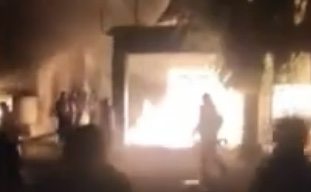Pakistan and Sectarian Massacres: Shia and Sunni Violence
Kanako Mita and Sawako Utsumi
Modern Tokyo Times

In recent years, over 1,000 people have been killed each year in Pakistan. This concerns Islamic terrorism, Shia and Sunni sectarianism, and ethnic bloodshed. At the same time, minority Ahmadiyya Muslims, Christians, and Hindus face institutional discrimination.
Reuters reports, “On Thursday unidentified gunmen opened fire on passenger vehicles, killing over 40 in the Kurrram district, where armed Shia and Sunni Muslims have engaged in tribal and sectarian rivalry for decades over a land dispute near the Afghanistan border.”
This massacre – according to reports – was done by Sunni Muslims. Accordingly, the majority of victims were Shia Muslims.
Since then, another massacre occurred in the same region. Hence, France 24 reports, “More than 30 people have been killed and dozens more wounded after Shiite Muslims on Friday attacked a Sunni-dominated market and set it on fire in the mountainous Khyber Pakhtunkhwa province, in northwestern Pakistan. Sporadic fighting has regularly broken out between the two groups in the area in recent months, leading to more than 150 deaths.“
The Dawn reports, “Efforts were underway on Saturday to restore peace in Khyber Pakhtunkhwa’s Kurram District as 18 more people were killed and another 30 injured in fresh clashes.”
Ethnic tensions also blight Balochistan. Hence, the Balochistan Liberation Army (BLA) and other insurgent groups seek to break free from Pakistan (or at least to have greater autonomy).
Tit-for-tat massacres don’t spare children and women. Thus, regional authorities face an uphill struggle to contain the crisis.
The BBC reports, “Kurram, in Pakistan’s north-west, also borders several Afghan provinces which are home to anti-Shia militant groups, including the Islamic State group and the Tehrik-e-Taliban Pakistan (TTP).”
Lee Jay Walker (Modern Tokyo Times analyst) says, “The religion of Buddhism once flourished in Gilgit-Baltistan before Islamic invasions and Sufi policies of sowing religious confusion altered the course of history – similar to the crushing of Buddhism, Hinduism, Nestorian Christianity, and Zoroastrianism in Afghanistan. However, Islam didn’t generate unity, modernity, or religious solace. Accordingly, the nations of Afghanistan and Pakistan are blighted by sectarianism, Takfiri ideology, ethnic issues, terrorism, and a place where religious minorities are persecuted.”
Pakistan is blighted by Islamic religious fundamentalism, ethnic divisions, sectarianism, political intrigues, and other ills that impact on society.

Modern Tokyo News is part of the Modern Tokyo Times group
http://moderntokyotimes.com Modern Tokyo Times – International News and Japan News
http://sawakoart.com – Sawako Utsumi’s website and Modern Tokyo Times artist
https://moderntokyonews.com Modern Tokyo News – Tokyo News and International News
PLEASE JOIN ON TWITTER
https://twitter.com/MTT_News Modern Tokyo Times
PLEASE JOIN ON FACEBOOK